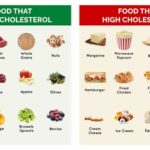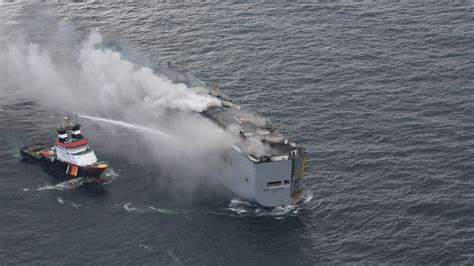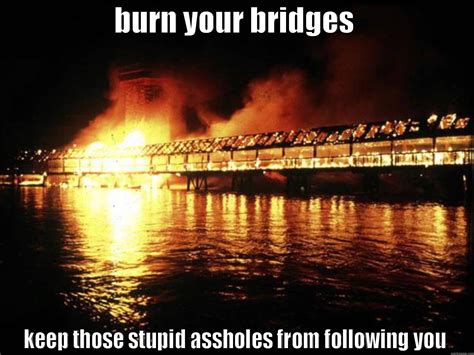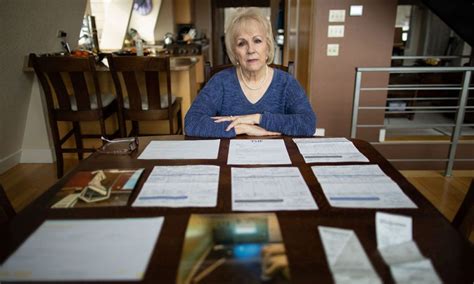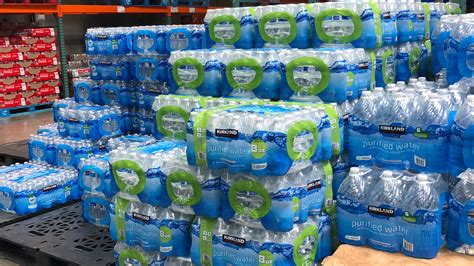
Costco shoppers should check their refrigerators: Kirkland Signature Sparkling Water is being recalled due to potential microbial contamination that could cause illness. The recall, initiated by Niagara Bottling LLC, impacts three varieties of the popular beverage sold in the western United States.
Niagara Bottling LLC has voluntarily recalled three varieties of Kirkland Signature Sparkling Water sold at Costco stores in specific western U.S. regions due to concerns about potential microbial contamination, which could present a health risk to consumers. The recall affects sparkling water produced between June 10 and August 14, 2024.
The affected products include:
- Kirkland Signature Sparkling Water Variety Pack, 24/12 fl oz cans
- Kirkland Signature Sparkling Water Grapefruit, 12/12 fl oz cans
- Kirkland Signature Sparkling Water Lemon, 12/12 fl oz cans
Costco members who purchased these products are urged not to consume them and to return them to their local Costco for a full refund.
Details of the Recall
The recall was initiated after Niagara Bottling LLC identified potential microbial contamination during routine quality control checks at one of its manufacturing facilities. While the specific type of microbe has not been disclosed, the company stated that the contamination could lead to illness in individuals who consume the affected product.
“The quality and safety of our products are our highest priority,” Niagara Bottling LLC said in a statement. “We are taking this action out of an abundance of caution and are working closely with Costco to ensure that the affected products are removed from store shelves.”
The recall specifically targets products sold in the following western states: California, Washington, Oregon, Utah, Nevada, Idaho, Montana, and Arizona. Costco has been notifying its members who purchased the affected products through email and in-store announcements.
Potential Health Risks
Microbial contamination in food and beverages can pose various health risks, depending on the type of microbe present. Some microbes can cause mild gastrointestinal symptoms, such as nausea, vomiting, and diarrhea, while others can lead to more severe illnesses. Individuals with weakened immune systems, infants, and the elderly are generally more susceptible to the adverse effects of microbial contamination.
While the specific microbe involved in the Kirkland Signature Sparkling Water recall has not been identified, consumers who experience any symptoms after consuming the product are advised to seek medical attention.
Consumer Actions
Costco members who have purchased the recalled Kirkland Signature Sparkling Water are advised to take the following actions:
- Check the product: Verify whether the sparkling water you purchased is one of the recalled varieties (Variety Pack, Grapefruit, or Lemon) and if it falls within the production dates of June 10 and August 14, 2024.
- Do not consume: Do not drink the recalled sparkling water. Discard the product immediately to prevent accidental consumption.
- Return to Costco: Bring the recalled sparkling water to your local Costco store for a full refund. You do not need to have the original receipt to receive a refund.
- Contact Costco or Niagara Bottling: If you have any questions or concerns about the recall, contact Costco’s customer service or Niagara Bottling LLC directly. Contact information is available on Costco’s website and in the recall announcement.
Costco’s Response
Costco has taken swift action to address the recall and ensure the safety of its members. The company has removed the affected products from its shelves and is actively notifying members who purchased the recalled sparkling water.
“Costco is committed to providing our members with safe and high-quality products,” said a Costco spokesperson. “We are working closely with Niagara Bottling LLC to resolve this issue and prevent future occurrences.”
Costco has also implemented additional quality control measures to prevent similar incidents from happening in the future. These measures include increased testing and monitoring of its suppliers’ manufacturing facilities.
Niagara Bottling LLC’s Statement
Niagara Bottling LLC has issued a statement regarding the recall, expressing its commitment to product safety and quality. The company is cooperating with regulatory authorities and Costco to ensure that the recall is conducted effectively.
“We understand the concerns that this recall may cause, and we want to assure our customers that we are taking every step possible to address this issue,” said a spokesperson for Niagara Bottling LLC. “We are committed to providing safe and high-quality products, and we are working diligently to resolve this matter.”
Niagara Bottling LLC is conducting a thorough investigation to determine the source of the contamination and implement corrective actions to prevent future incidents. The company is also reviewing its quality control procedures and sanitation practices to ensure that its products meet the highest safety standards.
Impact on Consumers
The recall of Kirkland Signature Sparkling Water has undoubtedly caused concern among Costco members, particularly those who regularly consume the product. Many consumers rely on sparkling water as a healthy and refreshing beverage option, and the recall may disrupt their routines and raise questions about the safety of other products they purchase.
Some consumers have expressed frustration with the recall, citing the inconvenience of having to return the product to Costco and the uncertainty about the potential health risks. However, most consumers appreciate Costco’s and Niagara Bottling LLC’s proactive approach to addressing the issue and prioritizing consumer safety.
Industry Implications
The Kirkland Signature Sparkling Water recall highlights the importance of rigorous quality control measures in the food and beverage industry. Microbial contamination can occur at any stage of the manufacturing process, from raw material sourcing to packaging and distribution. Companies must implement comprehensive testing and monitoring programs to detect and prevent contamination.
The recall may also prompt consumers to scrutinize the safety and quality of other sparkling water brands and beverages. This increased scrutiny could lead to greater demand for products that are certified by independent organizations and have a proven track record of safety and quality.
Regulatory Oversight
The food and beverage industry is subject to stringent regulations and oversight by government agencies, such as the Food and Drug Administration (FDA) in the United States. These regulations are designed to ensure that products are safe for consumption and that manufacturers adhere to strict quality control standards.
In the event of a recall, regulatory agencies work closely with companies to investigate the cause of the contamination and ensure that the recall is conducted effectively. The agencies may also impose penalties on companies that violate regulations or fail to take adequate measures to prevent contamination.
Future Prevention
To prevent future incidents of microbial contamination, Niagara Bottling LLC and other beverage manufacturers must implement several key measures, including:
- Enhanced Sanitation: Implementing rigorous sanitation procedures in all manufacturing facilities, including regular cleaning and disinfection of equipment and surfaces.
- Water Treatment: Ensuring that water used in the production process is properly treated and purified to remove any potential contaminants.
- Raw Material Testing: Conducting thorough testing of all raw materials, including ingredients and packaging materials, to ensure that they meet safety standards.
- Process Controls: Implementing strict process controls to monitor and control critical parameters, such as temperature, pH, and pressure, throughout the manufacturing process.
- Employee Training: Providing comprehensive training to employees on hygiene, sanitation, and food safety practices.
- Regular Audits: Conducting regular audits of manufacturing facilities to identify and address any potential weaknesses in the quality control system.
Broader Context of Food and Beverage Recalls
Food and beverage recalls are not uncommon, and they can occur for a variety of reasons, including microbial contamination, undeclared allergens, foreign object contamination, and labeling errors. In recent years, there have been several high-profile recalls of various food and beverage products, highlighting the challenges that companies face in ensuring product safety.
The increasing complexity of the global food supply chain has also contributed to the rise in food and beverage recalls. Many products are now sourced from multiple countries, making it more difficult to track and control the quality and safety of ingredients and materials.
Consumer Confidence
Food and beverage recalls can erode consumer confidence in the safety of the food supply. To maintain consumer trust, companies must be transparent and proactive in addressing recalls and taking steps to prevent future incidents.
Consumers can also play a role in ensuring food safety by staying informed about recalls and following safe food handling practices. The FDA and other government agencies provide valuable information and resources on food safety, including recall announcements and tips for preventing foodborne illnesses.
Conclusion
The recall of Kirkland Signature Sparkling Water serves as a reminder of the importance of food safety and the need for companies to prioritize quality control. While recalls can be disruptive and concerning for consumers, they also demonstrate the effectiveness of the regulatory system and the commitment of companies to protecting public health.
Consumers who have purchased the recalled Kirkland Signature Sparkling Water should follow the recommended actions and contact Costco or Niagara Bottling LLC with any questions or concerns. By working together, companies, regulators, and consumers can help ensure the safety and quality of the food and beverage supply. The incident also underscores the need for continuous improvement in food safety practices and the importance of staying vigilant about potential risks. The potential for microbial contamination, even in seemingly straightforward products like sparkling water, demonstrates the complexity of maintaining a safe and reliable food supply chain. It also reiterates the responsibility of both manufacturers and retailers to uphold stringent safety standards and act swiftly in the face of potential hazards.
The ongoing investigation into the source of the contamination will likely provide valuable insights into potential vulnerabilities in the manufacturing process and inform future preventative measures. Until then, consumers are advised to remain cautious and informed about food safety recalls and to follow the guidance provided by health authorities and product manufacturers. The long-term impact of this recall on consumer trust in the Kirkland Signature brand and Costco remains to be seen, but the company’s response and commitment to resolving the issue will play a critical role in restoring confidence.
Expanded Analysis
The recall of Kirkland Signature Sparkling Water goes beyond a simple product defect; it touches upon broader themes of food safety, supply chain management, and consumer trust. The fact that a seemingly simple product like sparkling water is subject to such a recall underscores the complexity of ensuring food safety in a modern, globalized food system. Niagara Bottling LLC’s response to the incident, along with Costco’s handling of the recall, will be scrutinized by industry observers and consumers alike.
The incident also highlights the critical role of preventative measures and proactive quality control. Relying solely on reactive measures, such as recalls, is insufficient to guarantee the safety of food products. Manufacturers must invest in robust quality control systems, including regular testing, sanitation protocols, and employee training, to minimize the risk of contamination.
The transparency and communication surrounding the recall are also crucial. Consumers need accurate and timely information about the potential risks and what actions they should take. Clear and consistent communication from both Niagara Bottling LLC and Costco will help to maintain consumer trust and prevent unnecessary anxiety.
The economic impact of the recall should also be considered. Recalls can be costly for manufacturers, both in terms of direct expenses (e.g., product retrieval, refunds) and indirect costs (e.g., damage to brand reputation, loss of sales). While the financial impact of the Kirkland Signature Sparkling Water recall is unlikely to be catastrophic for either Niagara Bottling LLC or Costco, it serves as a reminder of the significant economic risks associated with food safety failures.
Furthermore, the recall may have broader implications for the sparkling water market. Consumers may become more discerning about the brands they choose and may seek out products that are certified by independent organizations or that have a strong reputation for quality and safety. This could lead to increased competition among sparkling water brands and may incentivize manufacturers to invest more in quality control and transparency.
Finally, the Kirkland Signature Sparkling Water recall underscores the importance of collaboration among manufacturers, retailers, and regulatory agencies. A coordinated effort is essential to effectively manage recalls and to prevent future food safety incidents. Open communication, data sharing, and joint investigations can help to identify potential vulnerabilities in the food supply chain and to develop effective solutions.
The Importance of Stringent Manufacturing Processes
The Niagara Bottling recall shines a light on the complexity of beverage manufacturing and the critical importance of meticulous quality control. Even seemingly simple products like sparkling water require stringent processes to prevent contamination and ensure consumer safety.
Water source and treatment are primary concerns. Niagara Bottling, like other beverage manufacturers, likely utilizes a combination of municipal water sources and proprietary treatment processes to ensure purity. These processes can include filtration, ultraviolet (UV) disinfection, and ozonation to eliminate potential contaminants.
The bottling process itself must also be carefully controlled. Bottles and cans must be thoroughly cleaned and sanitized before being filled with sparkling water. The filling process must be conducted in a sterile environment to prevent microbial contamination.
Regular testing is essential to verify the effectiveness of these processes. Niagara Bottling likely conducts routine tests for bacteria, viruses, and other contaminants. These tests may be performed at various stages of the manufacturing process, from raw water intake to finished product packaging.
In the event of a positive test result, manufacturers must take immediate action to identify the source of the contamination and prevent further spread. This may involve shutting down production lines, sanitizing equipment, and tracing the source of the contaminated water or ingredients.
The Kirkland Signature Sparkling Water recall suggests that there was a breakdown in one or more of these processes. The precise cause of the contamination is still under investigation, but it highlights the potential for even minor lapses in quality control to have significant consequences.
The Role of Regulatory Agencies in Food Safety
The Food and Drug Administration (FDA) plays a critical role in overseeing the safety of food and beverages in the United States. The agency establishes standards for food safety, inspects manufacturing facilities, and enforces regulations to prevent contamination.
In the event of a food safety recall, the FDA works closely with manufacturers to ensure that the recall is conducted effectively and that consumers are informed about the potential risks. The FDA also conducts its own investigations to determine the cause of the contamination and to prevent future incidents.
The FDA has the authority to issue recalls, seize contaminated products, and impose penalties on companies that violate food safety regulations. The agency also works with other government agencies and international organizations to coordinate food safety efforts.
While the FDA has broad authority to regulate food safety, it also relies on manufacturers to self-regulate and to implement robust quality control systems. The Kirkland Signature Sparkling Water recall underscores the importance of both government oversight and industry self-regulation in ensuring the safety of the food supply.
FAQ
1. What Kirkland Signature Sparkling Water products are affected by the recall?
The recall affects three varieties of Kirkland Signature Sparkling Water: Variety Pack (24/12 fl oz cans), Grapefruit (12/12 fl oz cans), and Lemon (12/12 fl oz cans). These products were produced between June 10 and August 14, 2024.
2. Why is the Kirkland Signature Sparkling Water being recalled?
The sparkling water is being recalled due to potential microbial contamination identified during routine quality control checks. The specific microbe has not been identified.
3. What should I do if I purchased the recalled Kirkland Signature Sparkling Water?
Do not consume the product. Return it to your local Costco store for a full refund, even without a receipt.
4. What are the potential health risks of consuming the contaminated sparkling water?
Microbial contamination can cause various health risks, including gastrointestinal symptoms such as nausea, vomiting, and diarrhea. Individuals with weakened immune systems, infants, and the elderly are at higher risk of more severe illness.
5. Where were the affected Kirkland Signature Sparkling Water products sold?
The recalled products were sold at Costco stores in the western United States, specifically in California, Washington, Oregon, Utah, Nevada, Idaho, Montana, and Arizona.





